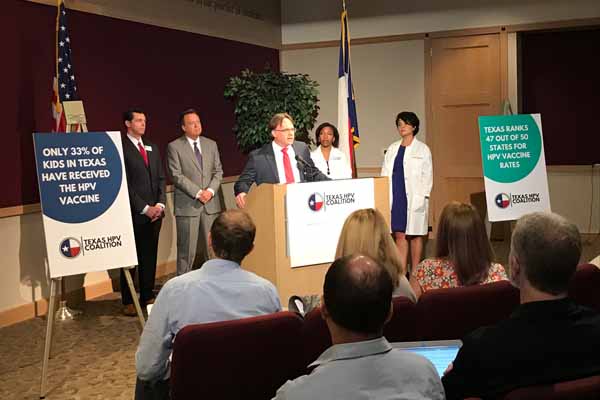
Texas has one of the worst rates of vaccinations for human papilloma virus (HPV) in the United States, aided, in part, by its rocky history in the state.
In 2007, Gov. Rick Perry became the first governor in the country to order that young girls be vaccinated against HPV. His decision, though medically sound, quickly became controversial.
HPV is the most common sexually transmitted infection, and news stories about Governor Perry's order emphasized this. However, many parents feared that getting the vaccine for their kids would encourage promiscuity. The Texas Legislature overturned the order.
Since then, some Texas physicians have been hesitant to promote the vaccine, and many present it as optional rather than necessary for good health.
To help improve HPV vaccination rates, the Texas Medical Association joined with a coalition of more than 40 other organizations Tuesday to announce a renewed statewide immunization campaign to prevent HPV-related cancers.
Representatives from TMA and Texas HPV Coalition partners — including the American Cancer Society, The University of Texas System, and MD Anderson Cancer Center — gathered at TMA's Austin headquarters for a press conference kicking off the initiative, which supports the national campaign, “Mission: HPV Cancer Free.”
Speaking to Texas Medicine Today, Keller pediatrician Jason Terk, MD, pointed out that pediatricians are primarily responsible for providing this vaccination. But because pediatricians don’t see patients with HPV-associated cancers, they may be less motivated to strongly encourage HPV vaccination.
"We're providing a vaccination for cancers that will arise 20 or 30 years down the road," said Dr. Terk, chair of the TMA Council on Legislation and past president of the Texas Pediatric Society. "That sort of remoteness of consequence affects not just the family's decision but also the pediatrician's investment in giving this vaccine."
It’s important that physicians make it clear to their patients' families that the HPV vaccine is a life-saving measure that can prevent cancer, Dr. Terk said.
"If you look at studies of encounters where physicians competently respond to hesitancy about HPV vaccination by answering questions respectfully, dispelling myths, and continuing to recommend the vaccination, upwards of 50 percent of the people who were originally going to not get the vaccination will ultimately get the vaccine," he said.
An HPV vaccine has been around for 12 years, but Texas ranks 47th nationally in HPV vaccination rate of teens. Fewer than half of Texans ages 13 to 17 had received one dose of the multi-dose HPV vaccine in 2016. That year, about 60 percent of teens nationally had received at least one dose of HPV vaccine, the U.S. Centers for Disease Control and Prevention (CDC) reports.
Meanwhile, the CDC reports that 31,500 people each year are diagnosed with cancer related to HPV, 90 percent of which are vaccine-preventable.
In May, the TMA House of Delegates approved an eight-point plan designed to help improve vaccine rates. The plan includes:
- Developing a robust, physician-curated resource center on the TMA website;
- Developing a data workgroup to identify data deficiencies and needed interventions;
- Disseminating best practices to improve HPV immunization rates; and
- Requesting that the Department of State Health Services share HPV county data with the epidemiologists responsible for immunization programs.